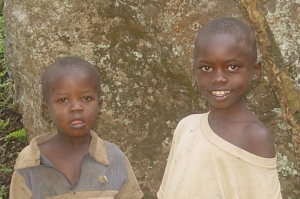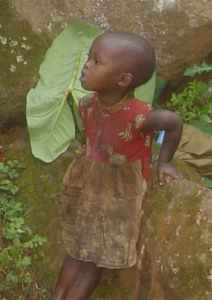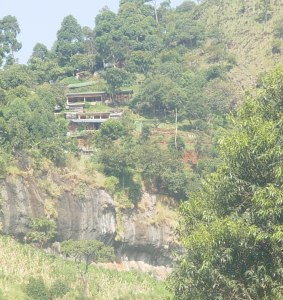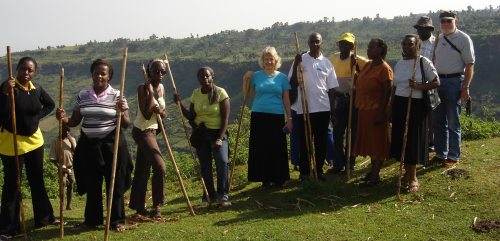Dr. Ruby Dunlap’s Uganda Fulbright Blog
Members who could from UCU’s health sciences department spent the weekend in a retreat at Sipi Falls near the Kenya border. That I survived this experience is testament to a God in heaven. It all began innocently enough with Faith, one of those splendidly capable young women such as Belmont’s school of nursing has in Karen and Heather, telling me “we would do a little walking.” Faith had organized the whole thing, all the meals and the stay at the Crow’s Nest at Sipi Falls. Why that name didn’t make me suspicious I’ll never know.
We loaded up on the school of nursing bus: department head, physician Mike Smith who, besides myself, was the only other expatriate. Faith, Maureen, and Dorothy, department administrative coordinators. Jemimah, the chair of nursing.
Edward, a physician, who is the administrator of a MBA in healthcare. Francis, one of the instructors for their BS in community health, an important non-nursing health profession in developing countries. Clarissa and Selah (pronounced Sell-ah) from the MPH in maternal-infant health. Mike told me it’s actually an MPHL (MPHLeader) degree, open to anyone with a previous bachelor’s degree and very popular; it has UCU’s largest enrollment for a health profession. Tom was our driver. And finally, Grace and the other Faith, two of my MNS students and also faculty for the RN-BNS program. Here’s a photo of our first meal stop, lunch on Friday. I had beans and rice with greens, all delicious.
Ugandans may talk very softly in formal situations but our bus was full of rambunctious chatter, teasing, jokes, and loud merriment from the Ugandans. We had started off waiting about 30 minutes for Francis and “Where’s Francis?” became one of the standing jokes for the group. He was late to everything including meals. These will be my closest colleagues here at UCU, very bright, highly literate professionals, relatively affluent, and as delightful company as anyone could ask for. Ugandans generally love their cell phones and this group’s beeped, chimed and hip-hopped cell tones and text message alerts throughout the trip.
It was a six hour trip. From Mukono where we live, we headed east, past miles of sugar cane and tea plantations and over the infant Nile River which begins in Jinja, Uganda. A drop of water in the Nile at Jinja takes three months to reach Egypt and the Mediterranean Sea. After Jinja, the land becomes drier looking and pancake flat until one reaches Iganga, a marketing crossroads which Bob has visited to help with the construction budget of a friend’s project there. It eventually becomes marshy and one sees mile after mile of rice fields. The road passes through village after village, each with similar open air markets full of produce. See photo. At Mbale—Ugandans seem to add “town” to that so it’s “Mbale Town,” I got my first shock and a little shiver of concern.
Mbale is Uganda’s second largest city following Kampala. It used to be Uganda’s cleanest city, I was told, but has gone rapidly downhill in the past few years. But what made me shiver was not all the trash but the sight of Mt. Elgon shooting up to over a 12,000 foot rocky summit from the flat country west of it. I wondered then what “a little walking” would mean but put it out of my head, absorbed in the rocky beauty of mountains which might have had snow on their tops had they been in higher latitudes. See photo of Elgon.
 Tom skillfully steered our bus through hairpin loops as we climbed a mountain just northeast of Elgon, passing lush stands of coffee shrubs with ripening berries, corn, cabbages, bananas, and beans. We also passed, as we had done from the moment we left, one hamlet after another of mud huts, some round, some square, some thatched, some with rusty tin roofs, and all of them with mobs of children in and around them. It is rare to see a woman of childbearing age without a babe in arms, a toddler, and stair-stepping up in age, a parade of children after her. Africa is a continent of children, millions of them. See photos of children.
Tom skillfully steered our bus through hairpin loops as we climbed a mountain just northeast of Elgon, passing lush stands of coffee shrubs with ripening berries, corn, cabbages, bananas, and beans. We also passed, as we had done from the moment we left, one hamlet after another of mud huts, some round, some square, some thatched, some with rusty tin roofs, and all of them with mobs of children in and around them. It is rare to see a woman of childbearing age without a babe in arms, a toddler, and stair-stepping up in age, a parade of children after her. Africa is a continent of children, millions of them. See photos of children.
 Education substantially reduces the birth rate; nothing else seems to. Incidentally, my guess is that “potty training” if a potty one has, works best if one forgoes clothing from the waist down because I saw quite a few toddler aged children naked from the waist down in the villages. We eventually reached our camp site, across the gorge from Sipi Falls, a three tiered waterfall spilling in stages from the mountain peak just across from the camp. Photo. The beauty left one speechless. (See first photo at top) At that point we were about at a 10,000 foot elevation.
Education substantially reduces the birth rate; nothing else seems to. Incidentally, my guess is that “potty training” if a potty one has, works best if one forgoes clothing from the waist down because I saw quite a few toddler aged children naked from the waist down in the villages. We eventually reached our camp site, across the gorge from Sipi Falls, a three tiered waterfall spilling in stages from the mountain peak just across from the camp. Photo. The beauty left one speechless. (See first photo at top) At that point we were about at a 10,000 foot elevation.
The Crow’s Nest is a camp site perched on the side of a mountain with African style cabins. I had a two-room cabin to myself. When I write “rustic” I mean an inch crack around the door and daylight showing through the walls which w ere constructed of boards and bamboo. The bed filled one of the rooms. The other room had a concrete structure with a toilet seat cemented onto the top of it. It was a latrine. A yellow plastic jerry can of water with a plastic basin stood beside it. The floor was sloping concrete with strange ridges formed in it; I never did figure out what they were for. The door was low, good for several head whackings. See photo of Crow’s Nest camp site.
ere constructed of boards and bamboo. The bed filled one of the rooms. The other room had a concrete structure with a toilet seat cemented onto the top of it. It was a latrine. A yellow plastic jerry can of water with a plastic basin stood beside it. The floor was sloping concrete with strange ridges formed in it; I never did figure out what they were for. The door was low, good for several head whackings. See photo of Crow’s Nest camp site.
We were served delicious traditional Ugandan food in our own dining area and meeting room, all rustic. Rice, chapattis, a fried bread borrowed from the Indians who had been brought to Africa during the colonial period, matooke (pronounced mah-TOE-kee), a potato-like preparation from plantains which is a staple throughout Uganda, groundnut sauce with bamboo shoots, greens and slivered cabbage tasting a bit stirred-fried, and the fresh pineapple and bananas without which no Ugandan meal is quite complete. This was served with beef Friday night and with chicken Saturday night. The generator ran feebly for a couple of hours every night; otherwise, there was no electricity in the cabins.

After breakfast, we’ll do a little hiking,” Faith announced cheerfully. Hiking? I had only brought sandals, walking sandals to be sure. But everything sloped steeply here, there was no flat walking, and I was beginning to get a little concerned. After breakfast, we gathered as a group and Moses, the “hike” leader from Crow’s Nest, handed out bamboo walking sticks. “What do we need walking sticks for?” I asked suspiciously. “And I’m wearing a long skirt.” “You look just like an African woman,” Moses said soothingly. “You’ll do fine.” Here’s a photo of us lined up with our walking sticks. Some of us had already seen the descent behind us and are looking glum; I am naively still grinning. Some of my colleagues were, in fact, wearing flip-flops. Edward was wearing what looked like dress shoes.
The trail plunged over the edge of the gorge and wound, narrow, rocky, uneven, all the way to the bottom of Sipi Falls. One could not have safely done it without the walking stick to keep one stable over slippery descents. My legs began to feel rubbery and I was dripping wet with sweat. The temperatures were cool enough especially in the shaded parts. There was a little hut about half way down; the older Faith stopped to check her text messages. (See photo) “That’s a 21st century woman for you,” I teased. “You stop to check your texts half way down a cliff.”
The fall was spectacular but now I wasn’t the only one beginning to worry about getting back up to the top. “Don’t worry,” said Moses, “we’re going back by another way.”
That way proved shorter but much steeper with parts having to be done on all fours. The worst of all came when we rounded a turn alone a narrow ledge to see a crudely built ladder against a rocky wall. It was probably only about 20 feet tall but, to me at that point, it looked like it stretched to infinity. There was no way I could do it. But do it I had to. Every rung of that ladder felt like an encounter with death; I could too easily imagine losing my grip, hurtling down, and landing in a heap of shattered bones at the bottom. My head swam, my arms and legs barely cooperated at all, sweat was running in rivers, and all I could do was pray my way from one rung to the next. Somehow I found myself scrambling on all fours, gasping for breath, at the top rung and onto the path again, a faith-affirming patch of muddy earth, for I had done something which I did not believe naturally possible for me.
It was Jemimah’s 61st birthday and her experience was exactly as mine. “I will NEVER do that again,” she said. “NEVER.” She also said if she hadn’t been working out since May, she wouldn’t have been able to do it at all. I heartily agreed. Even Edward, probably the most fit in the group, said, “I was utterly spent at the top of that ladder.” Once we got to the top, we climbed a smaller slope to get behind the upper falls. See photo.
The retreat business was retreat business: getting to know each other which was truly delightful. Ugandans naturally integrate spirituality with their professional work; they don’t have to talk about “wholistic” healthcare because I don’t think they know any other alternative but a healing stance of the whole person toward the whole person. They haven’t had the centuries of body-mind-spirit compartmentalization with which the rational West has tried to explain reality since Descartes. Of course, the African integration of mind and matter also means the whole continent seems more susceptible to capricious superstitions of all kinds. Everything human beings think and do seems double-edged for good or bad. One cannot let one’s guard down against the characteristic corruption of either belief system.

Oh Ruby! What great adventures you are having. Thanks for such great writing to give us good pictures in our head. My heart was pounding when you spoke of the ladder! Praying for your continued safety and good works.
Susan
The last two sentences are a profoundly sharp-edged insight. I think another double-edged Sword, one which is all good, has been at work here.
Ruby, the pictures of the falls are beautiful! Your blog is so descriptive- I feel like I’m there with you, taking in everything. May the Lord bless you and keep your family safe!
I imagined climbing that ladder with you all the way! What a wonderful experience this year will be! What memories you are making! We keep you in our thoughts and miss you much in the quad.
Dr. Dunlap, Thanks for sharing! It sounds like you have already had so many amazing experiences! Our thoughts and prayers are with you.
Ruby, You are so missed and I loved looking at the beautiful pictures. As Sharon stated we miss you in the quad. The plants do not look very healthy. You are in my thoughts and prayers.
Thanks for such great writing to give us good pictures in our head. My heart was pounding when you spoke of the ladder! Praying for your continued safety and good works.
Ruby,
This is really great pictures you got here. And it is amazing to see exactly the way you have been doing in Kenya. Really a nice piece of story to read.